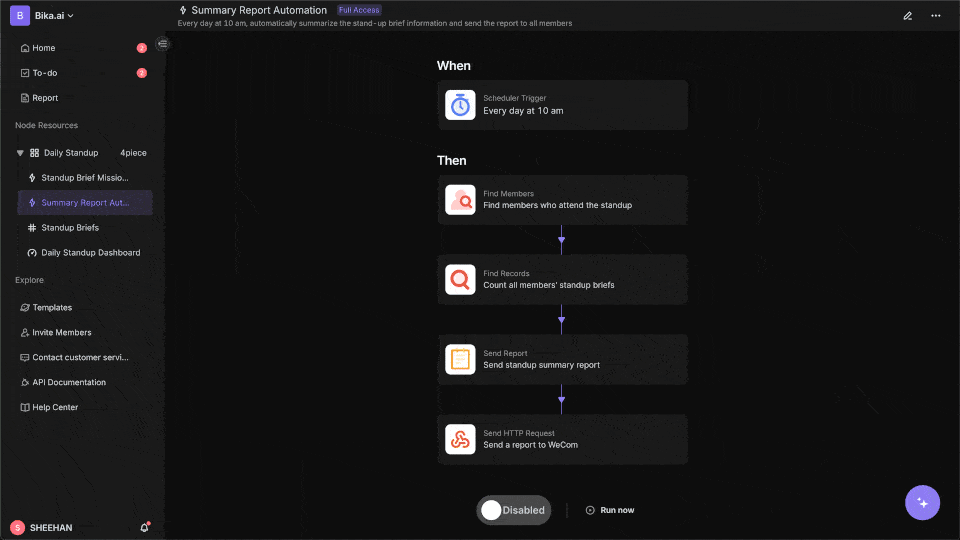
Grow Faster, Work Less: Top Marketing Automation Tools for Startups
Why Marketing Automation is Crucial for Startups in 2025
In 2025, startups are navigating a highly competitive business landscape with a unique set of challenges. Limited budgets and small teams are the norm, yet the need for rapid growth is ever - present. Marketing is a key driver of this growth, but traditional manual marketing processes can be time - consuming and resource - intensive, making it difficult for startups to scale effectively.
Marketing automation refers to the use of software platforms and technologies to automate repetitive marketing tasks. These tasks can range from email marketing campaigns, social media posting, lead scoring, and customer segmentation. The core purpose of marketing automation for businesses is to streamline marketing processes, improve efficiency, and deliver more personalized experiences to customers.
For startups, marketing automation tools offer a plethora of benefits. Firstly, efficiency is significantly enhanced. Startups can automate routine tasks such as sending welcome emails, follow - up messages, and lead nurturing sequences. This frees up valuable time for the marketing team to focus on more strategic initiatives, such as developing creative campaigns and analyzing market trends.
Secondly, consistent lead nurturing becomes possible. Marketing automation tools for start - ups can be programmed to send targeted messages to leads at different stages of the sales funnel. This ensures that leads are continuously engaged, increasing the likelihood of conversion. For example, a lead who downloads an e - book can be automatically sent a series of follow - up emails providing more in - depth information on the topic, along with product recommendations.
Personalized communication is another major advantage. By leveraging customer data, marketing automation tools can create highly personalized marketing messages. This not only improves the customer experience but also boosts the effectiveness of marketing campaigns. For instance, an e - commerce startup can use automation to send personalized product recommendations based on a customer's past purchases.
Data - driven decisions are facilitated through marketing automation. These tools collect and analyze data on customer behavior, campaign performance, and lead conversion rates. Startups can use this data to optimize their marketing strategies, allocate resources more effectively, and focus on the channels and tactics that are delivering the best results.
Finally, scalability is a key benefit. As startups grow, their marketing needs become more complex. Marketing automation tools can easily scale to accommodate increased volumes of leads, customers, and marketing activities. This allows startups to expand their marketing reach without having to hire a large number of additional staff.
:::: key-takeaways ::::
- Marketing automation boosts efficiency by automating repetitive tasks, freeing up time for strategic marketing initiatives.
- It enables consistent lead nurturing, increasing the chances of converting leads into customers.
- Personalized communication through marketing automation improves the customer experience and campaign effectiveness.
- Data - driven insights help startups optimize their marketing strategies and allocate resources efficiently.
- Marketing automation tools are scalable, growing with the startup's marketing needs. ::::
Top Marketing Automation Tools for Startups
In this section, we'll explore a curated list of leading marketing automation tools that are well - suited for startups. These tools have been selected based on their features, pricing, and ease of use, making them ideal for early - stage businesses looking to streamline their marketing efforts.
Brevo
Brevo is a comprehensive marketing automation platform that offers a wide range of features designed to help startups grow. It is particularly well - suited for startups that are focused on email marketing and customer relationship management.
Core Strengths: Brevo has a user - friendly interface, making it easy for non - technical marketers to get started. It offers a high - deliverability rate for emails, ensuring that your marketing messages reach your customers' inboxes. The platform also provides excellent customer support, which is crucial for startups that may need assistance in setting up and optimizing their marketing campaigns.
Key Features:
- Email Marketing: Brevo offers a drag - and - drop email editor, allowing you to create professional - looking emails without any coding knowledge. You can also segment your email lists based on various criteria, such as demographics, behavior, and purchase history, to send targeted emails.
- CRM Integration: It seamlessly integrates with popular CRM systems, enabling you to track customer interactions and manage leads more effectively.
- Landing Pages: Brevo allows you to create custom landing pages to capture leads. These landing pages can be easily integrated with your email marketing campaigns.
- Analytics: The platform provides detailed analytics on your email campaigns, including open rates, click - through rates, and conversion rates. This data helps you measure the success of your marketing efforts and make data - driven improvements.
- Pricing Model: Brevo offers a free plan with basic features, making it an attractive option for startups on a tight budget. It also has paid plans with more advanced features, which can be scaled as your business grows.
Pros/Cons:
- Pros: User - friendly, high email deliverability, good customer support, and a free plan.
- Cons: Some users may find the more advanced features a bit complex to set up initially.
HubSpot
HubSpot is a well - known marketing automation tool that offers an all - in - one solution for startups. It is suitable for startups that are looking for a comprehensive platform to manage their marketing, sales, and customer service activities.
Core Strengths: HubSpot has a vast library of marketing templates, including email templates, landing page templates, and social media templates. This makes it easy for startups to create professional - looking marketing materials quickly. The platform also offers a powerful lead scoring system, which helps you identify the most promising leads and prioritize your sales efforts.
Key Features:
- Email Marketing: HubSpot's email marketing tools allow you to create personalized email campaigns, schedule emails, and track email performance. You can also use A/B testing to optimize your email content.
- CRM: It comes with a built - in CRM system that provides a 360 - degree view of your customers. You can track customer interactions, manage deals, and assign tasks to your sales team.
- Landing Pages and Forms: HubSpot enables you to create high - converting landing pages and forms. These forms can be integrated with your CRM to capture and qualify leads.
- Analytics: The platform offers in - depth analytics on your marketing campaigns, website traffic, and lead generation. You can use these insights to optimize your marketing strategy.
- Pricing Model: HubSpot offers a free CRM, and its marketing automation plans start at a reasonable price. However, as you add more advanced features and users, the cost can increase.
Pros/Cons:
- Pros: Comprehensive features, large template library, powerful lead scoring.
- Cons: Can be expensive for startups with limited budgets as they scale, and the learning curve for some advanced features can be steep.
Customer.io
Customer.io is a marketing automation tool that focuses on customer - centric messaging. It is ideal for startups that want to send highly targeted and personalized messages to their customers at the right time.
Core Strengths: Customer.io excels in its ability to trigger messages based on customer behavior. For example, you can send a message to a customer who has abandoned their shopping cart, or a welcome message to a new user after they sign up. This real - time, behavior - based messaging can significantly improve customer engagement.
Key Features:
- Behavior - Based Messaging: The platform allows you to define triggers and actions based on customer behavior. You can create complex customer journeys and automate messages at each stage.
- Segmentation: Customer.io offers advanced segmentation capabilities, enabling you to divide your customer base into distinct groups based on various criteria.
- Email and In - App Messaging: You can send both email and in - app messages to your customers, providing a multi - channel approach to communication.
- Analytics: It provides detailed analytics on message performance, including open rates, click - through rates, and conversion rates for different segments.
- Pricing Model: Customer.io has a tiered pricing model based on the number of active customers. It offers a free trial, allowing startups to test the platform before committing.
Pros/Cons:
- Pros: Excellent for behavior - based messaging, advanced segmentation, and multi - channel communication.
- Cons: May be more expensive for startups with a large customer base, and the setup can be complex for those new to behavior - based marketing.
Mailchimp
Mailchimp is a popular marketing automation tool, especially known for its email marketing capabilities. It is a great choice for startups that are just starting out with marketing automation and want an easy - to - use platform.
Core Strengths: Mailchimp has a simple and intuitive interface, making it accessible to beginners. It also offers a wide range of pre - designed email templates, which can be customized to suit your brand. The platform has a large user community, which means there are plenty of resources and support available.
Key Features:
- Email Marketing: Mailchimp allows you to create, send, and track email campaigns. You can use its automation features to set up welcome emails, abandoned cart emails, and other automated sequences.
- Audience Segmentation: It enables you to segment your email list based on various factors, such as location, interests, and purchase history.
- E - commerce Integration: Mailchimp integrates well with popular e - commerce platforms, making it easy for online stores to manage their marketing efforts.
- Analytics: The platform provides basic analytics on email performance, including open rates, click - through rates, and unsubscribe rates.
- Pricing Model: Mailchimp offers a free plan with limited features, which is suitable for startups with a small email list. Its paid plans offer more advanced features and higher email sending limits.
Pros/Cons:
- Pros: User - friendly, large template library, free plan, and good e - commerce integration.
- Cons: Some advanced marketing automation features may be lacking compared to more comprehensive platforms, and the free plan has limitations.
Essential Features to Look for in Marketing Automation Tools for Your Startup
When choosing marketing automation tools for your startup, several key features and considerations should be taken into account.
Ease of Use/User Interface: Startups often have limited resources and may not have dedicated marketing automation experts. Therefore, the tool should have an intuitive user interface that is easy to navigate. A drag - and - drop editor for emails and landing pages, as well as a simple dashboard for managing campaigns, can significantly reduce the learning curve.
Pricing/Scalability: Given the budget constraints of startups, pricing is a crucial factor. Look for tools that offer a freemium model or affordable tiered plans. The tool should also be scalable, meaning that as your startup grows and your marketing needs become more complex, you can easily upgrade to a higher - level plan without having to switch to a completely different platform.
Core functionalities:
- Email Marketing: Email remains a powerful marketing channel. The tool should offer features such as email design, list segmentation, and campaign scheduling.
- Lead Scoring: This helps you prioritize leads based on their likelihood of converting. A good lead scoring system can save your sales team time by focusing on the most promising leads.
- CRM Integration: Integrating with a CRM system allows you to track customer interactions across different touchpoints. This provides a holistic view of the customer, enabling more personalized marketing and better sales - marketing alignment.
- Analytics: Comprehensive analytics are essential for measuring the success of your marketing campaigns. Look for tools that provide data on key metrics such as open rates, click - through rates, conversion rates, and customer engagement.
Integration capabilities with other tools: Startups typically use a variety of tools for different aspects of their business, such as CRM, sales, and website builders. The marketing automation tool should be able to integrate seamlessly with these other tools. For example, integrating with your e - commerce platform can help you automate marketing based on customer purchase behavior.
Customer Support & Resources: As a startup, you may need assistance in setting up and using the marketing automation tool. Look for tools that offer good customer support, including live chat, email support, and a knowledge base. Additionally, having access to training resources, such as webinars and tutorials, can help you get the most out of the tool.
When making the final choice, keep in mind that the right marketing automation tools for start - ups should align with your business goals, budget, and marketing strategy.
Beyond Standalone Tools: Elevating Marketing Automation with Workflow Integration
While marketing automation tools are great for handling specific marketing tasks, there is a need to connect and automate marketing workflows for more comprehensive and effective marketing. This is where platforms like Bika.ai come into play.
Bika.ai can orchestrate complex, cross - platform campaigns. For example, it can integrate data from your CRM system with your email marketing tool to create more personalized customer journeys. When a lead is marked as "qualified" in the CRM, Bika.ai can automatically trigger a series of targeted email campaigns, ensuring a seamless transition from lead generation to lead nurturing.
The benefits of such workflow integration are numerous. Deeper personalization becomes possible as data from multiple sources can be combined to create a more detailed customer profile. Seamless data flow between systems, such as from CRM to email and from sales to marketing, ensures that all departments are on the same page. Automated customer journeys can be created, guiding customers through the sales funnel with minimal manual intervention. This not only improves the customer experience but also increases operational efficiency.
Bika.ai is a powerful platform that enhances the capabilities of your chosen marketing automation tools. It acts as a central hub, connecting different marketing and business systems and enabling them to work together in harmony.

Real - World Automation: The Bika.ai Project tracker Template for ``
The Project tracker Template on Bika.ai is a valuable asset for startups looking to streamline their marketing tasks. This template is designed for project managers, team leads, and anyone involved in marketing project management.
Why you should use Project Tracker Template: It is the ultimate solution for efficient project management. In the context of marketing automation for start - ups, it allows teams to effortlessly manage and track project progress in real - time. This is crucial as marketing projects often involve multiple tasks, deadlines, and team members. With this template, you can say goodbye to chaos and hello to seamless project coordination.
How the template works: The template consists of two databases: "Overview" and "Tasks, timelines, and assignees". In the "Overview" database, you record project details such as name, status, project lead, working team, kickoff date, due date, budget, and links to tasks, timelines, and assignees. The "Tasks, timelines, and assignees" database helps you manage individual tasks, including their status, subtasks, assigned members, project leads, kickoff and due dates, and links back to the corresponding projects.
How to use:
- Open the
Project trackerTemplate. - In the "Overview" database, fill in the project details.
- For each project, link to the relevant tasks in the "Tasks, timelines, and assignees" database.
- In the "Tasks, timelines, and assignees" database, manage the tasks by setting their status, subtasks, assigned members, and due dates.
Key Features of This Template:
- Real - time tracking of project progress, which is essential for ensuring that marketing campaigns stay on schedule.
- Easy assignment of tasks and responsibilities, enabling clear communication within the team.
- Clear visualization of project status, allowing stakeholders to quickly understand the progress of a project.
- Seamless integration of project details and task management, streamlining the overall project management process.
In the context of marketing automation, this template can be used to streamline lead nurturing. For example, different tasks related to lead nurturing, such as sending follow - up emails, scheduling calls, and updating lead status, can be managed within the template. It can also enhance customer engagement by ensuring that all marketing activities are coordinated and executed efficiently.
This template enhances the value derived from any marketing automation tools for start - ups by making them part of a more intelligent, automated system.
Try the Project tracker Template
Conclusion: Powering Your Startup's Growth with Smart Automation
Marketing automation tools have the transformative power to revolutionize the way startups approach marketing. They offer a cost - effective and efficient way to engage leads, nurture customers, and drive growth. By choosing the right marketing automation tools, startups can streamline their marketing processes, make data - driven decisions, and deliver personalized experiences to their customers.
However, the real magic happens when these tools are integrated and automated further using platforms like Bika.ai. Bika.ai enables startups to create complex, cross - platform marketing workflows, enhancing personalization, data flow, and operational efficiency.
We encourage you to explore Bika.ai to build custom automations and achieve unprecedented marketing efficiency for your startup.
FAQ
Q: How can marketing automation tools help startups with limited budgets? A: Marketing automation tools can automate repetitive tasks, reducing the need for additional staff. Some tools also offer free or low - cost plans, such as Brevo's free plan and Mailchimp's free plan with basic features. This allows startups to get started with marketing automation without a large upfront investment.
Q: Which marketing automation tool is best for a startup focused on e - commerce? A: Mailchimp is a great option for e - commerce startups as it has good e - commerce integration. It can automate marketing based on customer purchase behavior, such as sending abandoned cart emails. However, if the startup is looking for more comprehensive features including CRM and advanced lead scoring, HubSpot could also be a suitable choice.
Q: How does Bika.ai enhance the capabilities of marketing automation tools? A: Bika.ai acts

Recommend Reading
- Automating AI Marketing Campaign Analysis: Bika.ai vs ChatGPT, Zapier, Make, and Airtable
- Elevate Your Presentations: The Best Presentation Software Alternatives to PowerPoint in 2025
- Beyond ChatGPT: Choosing the Right AI Tool for YouTube Publishing Process Automation - Bika.ai Compared
- Top RSS Reader Picks for 2025: Your Guide to Smarter Content Curation & Advanced Automation
- Elevate Your Presentations: The Best Presentation Software Alternatives to PowerPoint in 2025
Recommend AI Automation Templates








